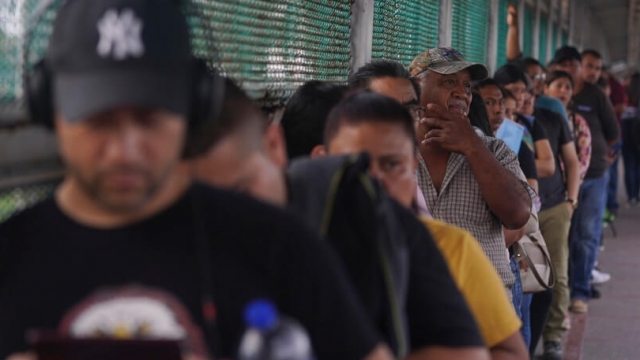Outside of the Brownsville, Texas, bus terminal, many migrants sit and wait to take their next steps in the United States. This is usually the first stop in a long journey once they've made it into the U.S. on humanitarian parole.
The federal government appears to be pleased so far with the implementation of new policies post Title 42. The Department of Homeland Security says numbers have gone down slightly since before changes in the law.
A local congressman who represents this district also thinks the policies appear to be working.
"We're starting to see more order on the border," Rep. Vicente Gonzalez said. "We're starting to see an orderly process of migrants not coming at the numbers that they were, and the numbers that are crossing now are under the capability and capacity of Border Patrol and CBP, and law enforcement on our border."
A local source in the U.S. Border Patrol's Rio Grande, not authorized to speak on the record but on background, told us that overnight crossing activity had slowed compared to earlier in the week.
One part of this immigration story involves Haitians seeking asylum. Before Title 42's expiration, Haitians found crossing between ports of entry were usually put on a one-way flight back to Port-au-Prince.
The U.S. State Department classifies dangers across the world through travel advisories. It says Haiti is as dangerous as Matamoros, Mexico.
SEE MORE: The end of Title 42 leaves many migrants looking for answers
The Haitians we've met in refugee camps say they're singled out in Mexico due to their skin color. Humanitarian aid groups say they're also targeted by extortionists and kidnappers.
Haitian refugees are also fearful of what happens if they don't apply for asylum using the U.S. government's smartphone-based appointment system.
The new Biden administration policies are harsher.
Migrants are now essentially barred from seeking asylum in the U.S. if they did not first apply online or seek protection in the countries they traveled through.
Guerline Jozef is in charge of the Haitian humanitarian group, the Haitian Bridge Alliance. She tells us there are thousands of Haitians stuck in Mexico, hoping for asylum in the United States.
"My dream is to have zero Haitians at the U.S.-Mexico border," Jozef said. "For my people to be able to be home, not only survive but to thrive. But two weeks ago, the gangs invaded my neighborhood, where I was born and raised, and people in my family got killed. My own cousin got killed by guns two or three weeks ago. So this is the reality that people are fleeing."
When people are given humanitarian parole, they are assigned an asylum court date. Federal agents then usually release them on their own recognizance.
Immigration lawyers Scripps News has spoken with say that because the asylum system is so clogged, appointments can be as little as two months away or as long as two years away. For people who are targeted for expedited removal or deportation, they have to be tracked by immigration, customs, and law enforcement if they're not detained. Usually, detention is costly.
Immigration and Customs Enforcement has pilot programs that are alternatives to detention and track migrants. The latest program uses smartphone watches that track migrants wherever they are in the United States.
Trending stories at Scrippsnews.com




